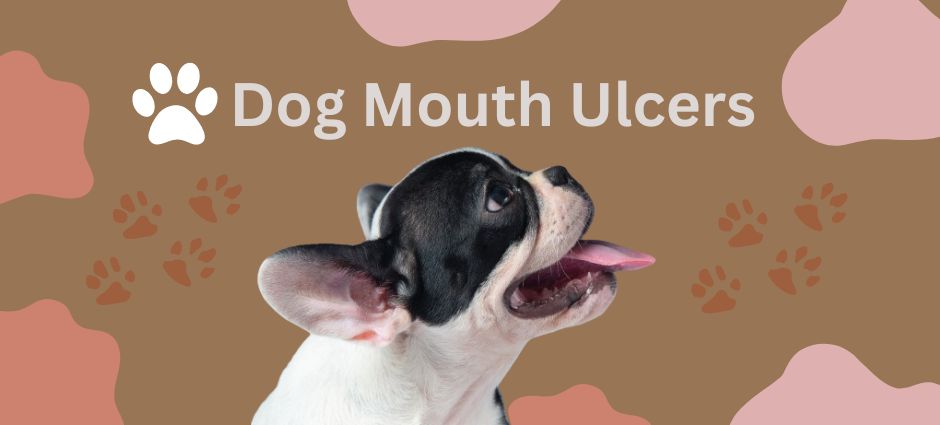Our furry companions bring us endless joy, but sometimes, they experience health issues that can cause them discomfort. One such problem is dog mouth ulcers, which can be quite painful for your big fluffy dog breeds.
This blog will delve into the world of ulcers in dog mouth, providing you with information to identify, understand, and address this condition effectively.
So, let’s deep dive into it!
What are Dog Mouth Ulcers?
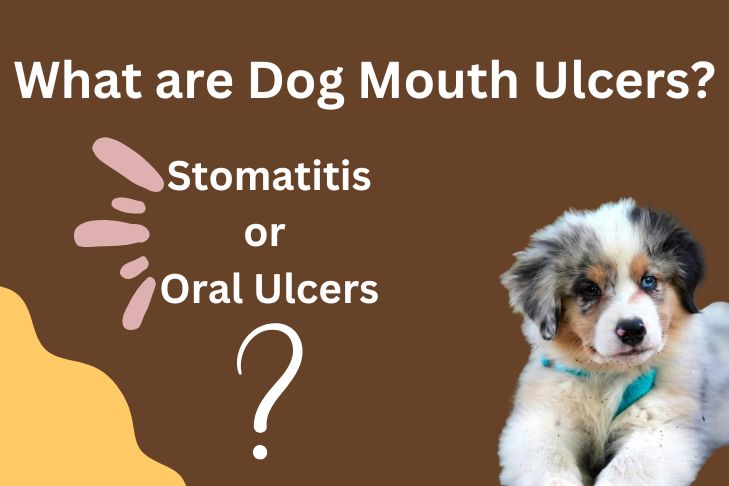
Dog mouth ulcers, also known as stomatitis or oral ulcers, are sores or lesions that develop on the soft tissues inside your dog’s mouth.
These ulcers can affect the gums, tongue, lips, or inner cheeks. They can be quite painful for your dog, making eating, drinking, and even playing uncomfortable.
What Causes Dog Mouth Ulcers?
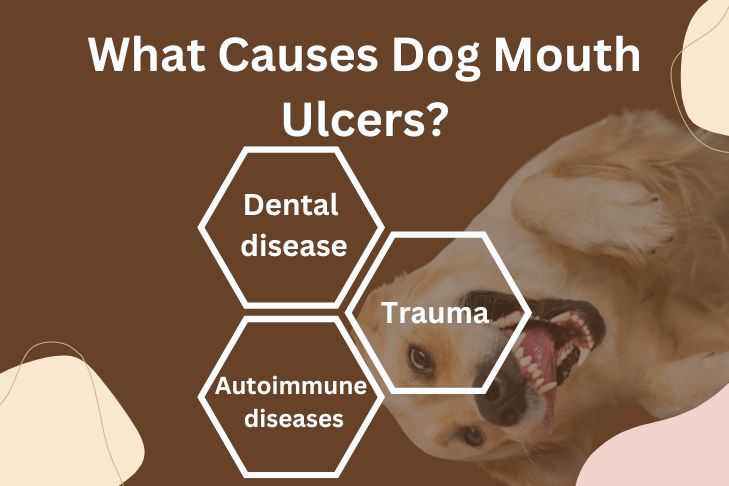
There are several potential causes of dog mouth ulcers. Some very common ones are:
- Dental disease: Tartar buildup and gingivitis can irritate the gums and lead to ulcer formation.
- Trauma: Injuries to the mouth caused by chewing on hard objects, playing with other dogs, or accidents can cause ulcers.
- Viral or bacterial infections: Certain viruses or bacteria can cause ulcers as part of the infection.
- Autoimmune diseases: In some cases, autoimmune diseases can attack the tissues in the mouth and cause ulcers.
- Nutritional deficiencies: Deficiencies in certain vitamins or minerals can contribute to mouth ulcers.
- Allergies: Food allergies or environmental allergies can sometimes identified as mouth ulcers.
- Medications: Certain medications can cause side effects like mouth ulcers in some dogs.
Read About: Dosage of Aspirin in Dogs
Signs and Symptoms of Dog Mouth Ulcers
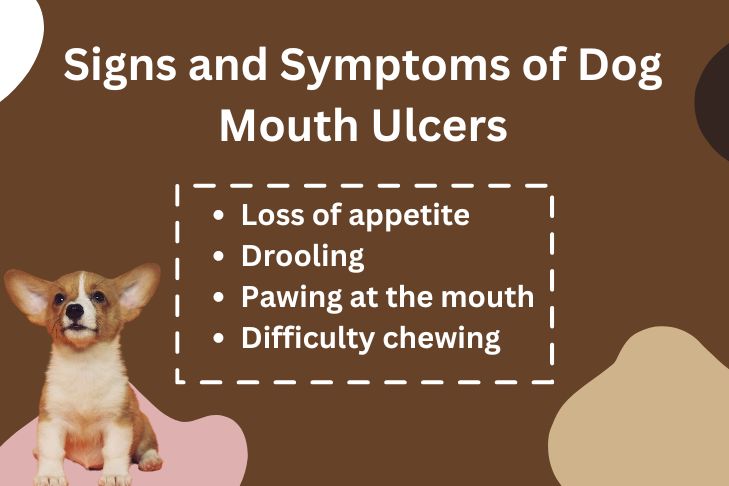
If your dog has a mouth ulcer, you might notice some of the following signs:
- Loss of appetite: This is a common symptom as eating can be painful.
- Drooling: Excessive drooling can be a sign of pain or discomfort in the mouth.
- Bad breath: Mouth ulcers can cause bad breath due to inflammation and potential bacterial growth.
- Pawing at the mouth: Your dog might try to paw at their mouth to alleviate the discomfort.
- Difficulty chewing: Chewing can be painful, so your dog might avoid hard food or chew toys.
- Bleeding from the mouth: In some cases, mouth ulcers can bleed slightly.
- Behavioral changes: Your dog might become withdrawn, lethargic, or irritable due to the pain.
When to See a Vet Immediately

While dog mouth ulcers can sometimes heal on their own with home care and pain management, some dog breeds big white as well as others require immediate veterinary attention. Here are some warning signs:
- Severe bleeding: If your dog’s mouth is bleeding excessively, seek immediate veterinary care.
- Difficulty breathing: Difficulty breathing or labored breathing could indicate an allergic reaction or swelling in the mouth.
- Fever: A fever can be a sign of infection and should be addressed promptly.
Diagnosing Dog Mouth Ulcers
If you suspect your dog has a mouth ulcer, it’s crucial to schedule an appointment with your veterinarian. They will conduct a thorough examination of your fluffy little dogs’ mouth, which might involve looking for signs of inflammation, redness, or bleeding.
Depending on the suspected cause, your vet might recommend additional tests like blood work, X-rays, or biopsies.
Treating Dog Mouth Ulcers
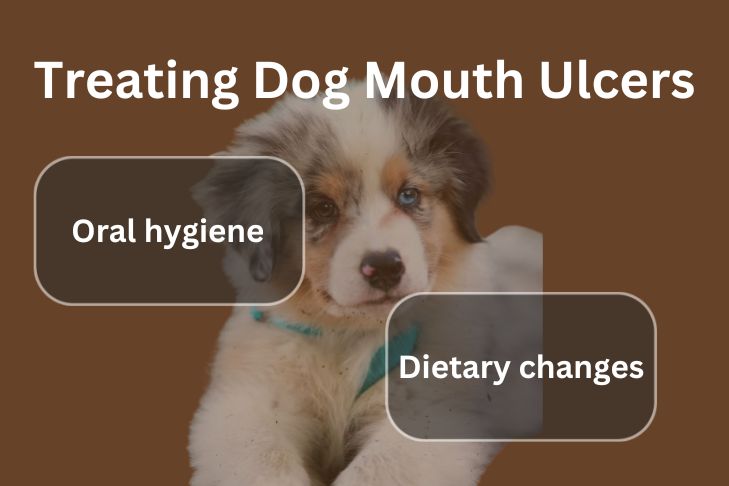
The treatment for dog mouth ulcers will depend on the underlying cause. Here are some common approaches:
- Treating the underlying cause: If the ulcers are caused by dental disease, your vet will likely recommend a dental cleaning. If an infection is present, antibiotics or antivirals might be necessary.
- Pain management: Medication can help alleviate the pain associated with mouth ulcers, making your chunky dog feel more comfortable.
- Dietary changes: Depending on the cause, your vet might recommend a change in diet to support healing and reduce inflammation.
- Oral hygiene: Maintaining good oral hygiene through regular brushing and dental chews can help prevent future ulcers.
Preventing Dog Mouth Ulcers
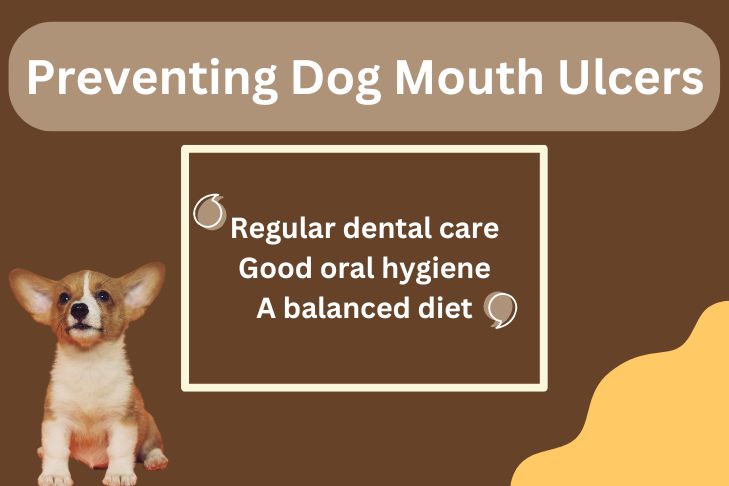
While not all mouth ulcers are preventable, here are some steps you can take to reduce the risk:
- Regular dental care: Schedule regular dental cleanings for your dog with your veterinarian.
- Good oral hygiene: Brush your doggo’s teeth every day with a dog toothpaste.
- A balanced diet: Ensure your pup receives a balanced and complete diet to meet their nutritional needs.
- Promptly address any injuries: If your big black and brown dogs injure their mouth, seek veterinary attention promptly to prevent infection.
Conclusion
Dog mouth ulcers can be a source of discomfort for your furry friend. By understanding the signs, causes, and treatment options, you can effectively address this condition and help your dog feel better.
Remember, early diagnosis is always key to a speedy treatment and recovery. If you have any concerns about your dog’s oral health, don’t hesitate to schedule an appointment with your veterinarian.



